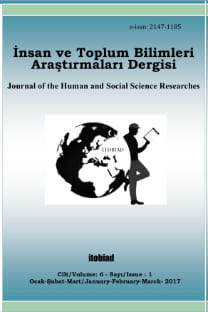Değişen Coğrafyalar, Değişen Zihniyetler: J.M. Coetzee’nin Güney Afrika ve Avustralya Yılları
Age of Iron, J.M. Coetzee, Sömürgecilik Sonrası, Disgrace, Slow Man, Diary of a Bad Year
Changing Geographies, Changing Mindsets: J. M. Coetzee’s South African and Australian Years
J.M.Coetzee, Postcolonial, Age of Iron, Disgrace, Slow Man, Diary of a Bad Year,
___
- Bibliography
- Main Sources
- Coetzee, J. M. (2018). Age of Iron. London: Penguin Books.
- Coetzee, J. M.(2007). Diary of a Bad Year. Penguin Books.
- Coetzee, J. M. (2000). Disgrace. Vintage.
- Coetzee, J. M. (2005). Slow Man. Random House.
- Secondary Sources
- Baudrillard, J. (1994). Simulacra and Simulation. University of Michigan Press.
- Berger, I. (2009). South Africa in World History. New York: Oxford University Press.
- Clark, N. L., & Worger, W. H. (2013). South Africa: The Rise and Fall of Apartheid. London: Routledge Taylor & Francis Group.
- Hamilton, C. (2011). The Cambridge History of South Africa. Cambridge: Cambridge Univ. Press.
- Head, D. (2009). The Cambridge Introduction to J.M. Coetzee. Cambridge: Cambridge University Press.
- Huggan, G., & Tiffin, H. (2015). Postcolonial Ecocriticism Literature, Animals, Environment. Florence: Taylor and Francis.
- Massey, D. S., & Denton, N. A. (2003). American Apartheid: Segregation and the Making of the Underclass. Cambridge, MA: Harvard Univ. Press.
- Poyner, J. (2016). J.M. Coetzee and the Paradox of Postcolonial Authorship. London: Taylor and Francis.
- Said, E. W. (1991). Orientalism. London: Penguin.
- Stolarek, J. “Problems of Multiculturalism and Multi-ethnicity in the Republic of South Africa in John Maxwell Coetzee's Selected Works”. Retrieved from https://www.academia.edu/14490724/Problems_of_multiculturalism_and_multi-ethnicity_in_the_Republic_of_South_Africa_in_John_Maxwell_Coetzee_s_selected_works
- Stolarek, J. Political, “Social and Cultural Aspects of Racism in Post-Apartheid South Africa in John Maxwell Coetzee’s Disgrace”. Retrieved from http://www.academia.edu/14490267/POLITICAL_SOCIAL_AND_CULTURAL_ASPECTS_OF_RACISM_IN_POST_APARTHEID_SOUTH_AFRICA_IN_JOHN_MAXWELL_COETZEE_S_DISGRACE.
- Thompson, L. M., & Berat, L. (2014). A History of South Africa. New Haven: Yale University Press.
- Wang, M. “Searching for Self-identity: A Postcolonial Study of J. M. Coetzee's Disgrace”. Retrieved from http://www.cscanada.net/index.php/sll/article/view/j.sll.1923156320130603.5280
- ISSN: 2147-1185
- Yayın Aralığı: Yılda 4 Sayı
- Başlangıç: 2012
- Yayıncı: Mustafa SÜLEYMAN ÖZCAN
Sürdürülebilir Kalkınma Hedefleri (SKH) Bağlamında Aracı Şehirler
Örgütsel Bilgi Paylaşım Reddi ile Bilgi Güvenliği Kültürü İlişkisinin İncelenmesi
Türk Modernleşmesinin Tarihsel Sosyolojisi: Tasnifler, Tipolojiler ve Yanılgılar
Brexit Sonrası Alternatif Ticaret Senaryoları ve Olası İktisadi Etkileri
Turist Yenilikçiliğinin Yenilikçi Otel Tercihi Üzerindeki Etkisi
Şule KIYCI, RAMAZAN AKSOY, Cenk Murat KOÇOĞLU
CAMELS Değerlendirme Sistemiyle Bankaların Finansal Performanslarının TOPSİS Yöntemiyle Analizi
Mehmet KAYGUSUZ, Behlül ERSOY, TUNGA BOZDOĞAN
Sosyal Hizmet Uygulamalarında Beden-Zihin-Ruh (Tin) Müdahaleleri
Fulya AKGÜL GÖK, Ezgi ARSLAN ÖZDEMİR
Değişen Coğrafyalar, Değişen Zihniyetler: J.M. Coetzee’nin Güney Afrika ve Avustralya Yılları
